Weight Loss Coaching: A Case Study on Motivation and Strategies
VerifiedAdded on 2021/11/22
|12
|3457
|256
Homework Assignment
AI Summary
This assignment presents a case study on weight loss coaching, focusing on a woman named Becky who seeks to reduce weight and improve her overall health. The assignment delves into case formulation and assessment, exploring the client's motivations, strengths, and challenges. It examines various coaching models, including Gerard Egan's skilled helper model, and the application of values and motivation theory. The paper emphasizes the importance of motivational interviewing techniques, setting realistic goals, and the use of stage theory of behavior change. Ethical considerations and strategies for long-term maintenance are also discussed, highlighting the role of the coach in supporting the client's journey towards a healthier lifestyle. The assignment also discusses the importance of Becky finding a new job to help structure her day and the need for her to seek professional help from a physician and join an exercising group. The coach's role is to motivate Becky to set new goals and to help her build a positive environment to achieve her goals.
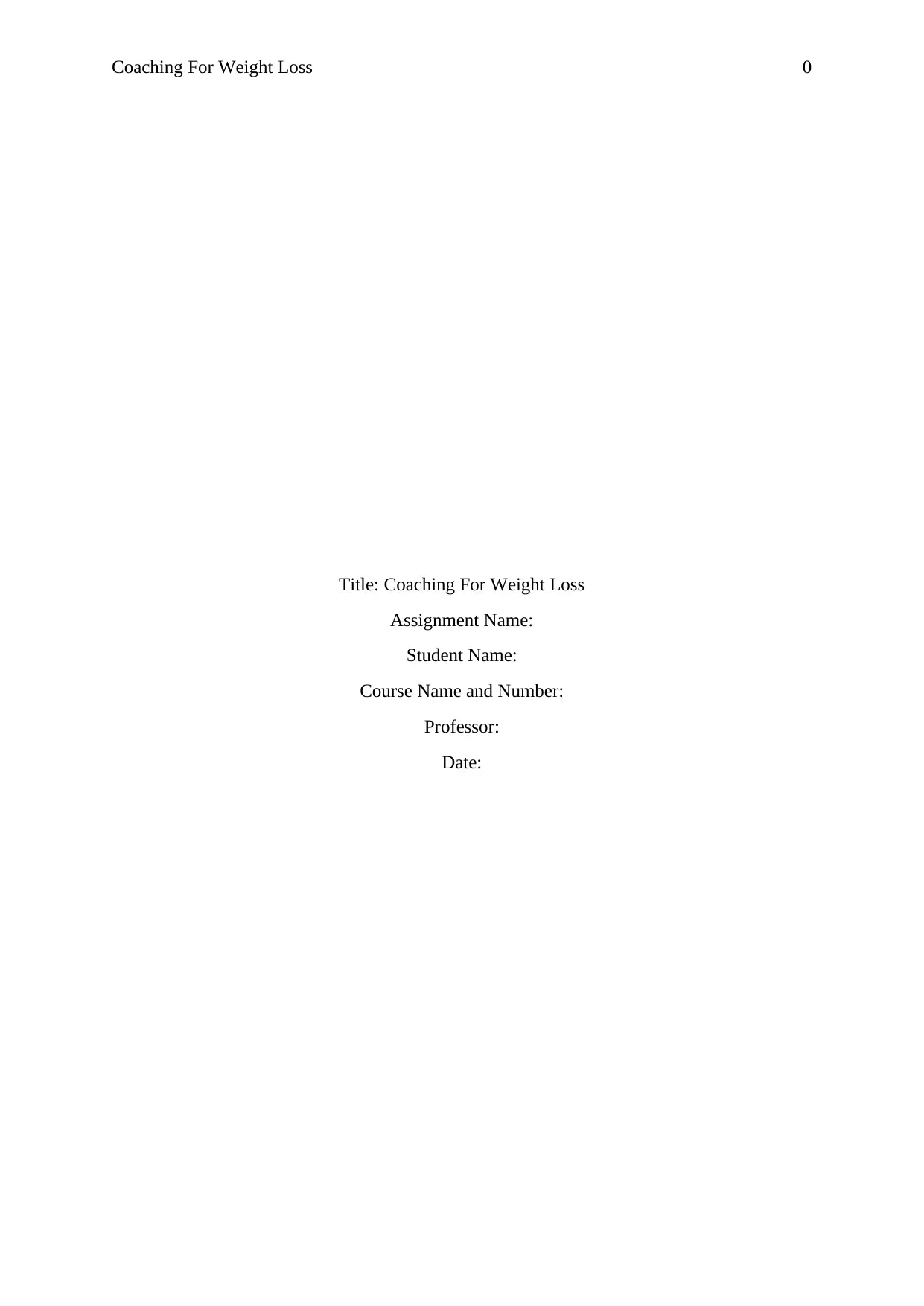
Coaching For Weight Loss 0
Title: Coaching For Weight Loss
Assignment Name:
Student Name:
Course Name and Number:
Professor:
Date:
Title: Coaching For Weight Loss
Assignment Name:
Student Name:
Course Name and Number:
Professor:
Date:
Paraphrase This Document
Need a fresh take? Get an instant paraphrase of this document with our AI Paraphraser
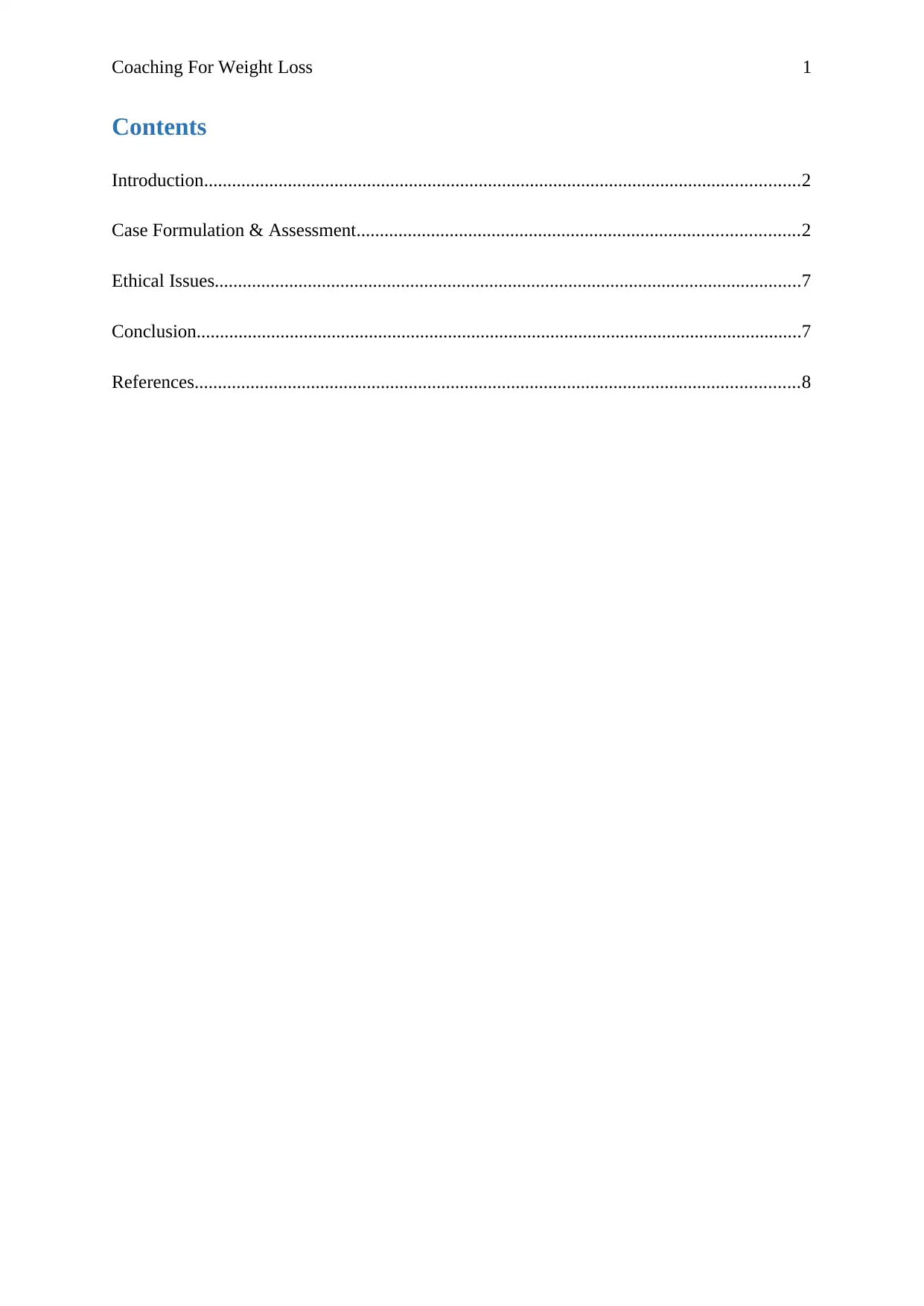
Coaching For Weight Loss 1
Contents
Introduction................................................................................................................................2
Case Formulation & Assessment...............................................................................................2
Ethical Issues..............................................................................................................................7
Conclusion..................................................................................................................................7
References..................................................................................................................................8
Contents
Introduction................................................................................................................................2
Case Formulation & Assessment...............................................................................................2
Ethical Issues..............................................................................................................................7
Conclusion..................................................................................................................................7
References..................................................................................................................................8
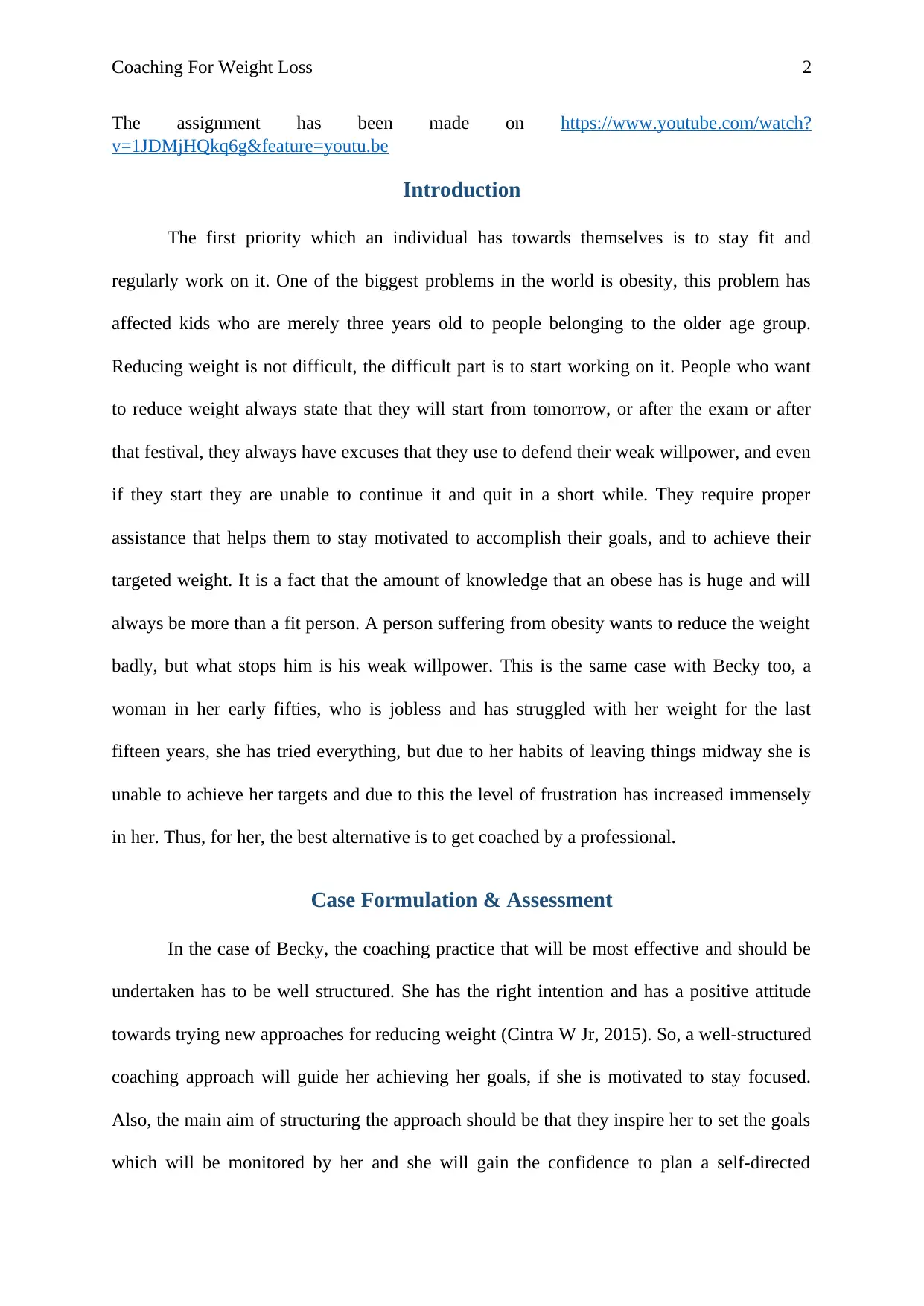
Coaching For Weight Loss 2
The assignment has been made on https://www.youtube.com/watch?
v=1JDMjHQkq6g&feature=youtu.be
Introduction
The first priority which an individual has towards themselves is to stay fit and
regularly work on it. One of the biggest problems in the world is obesity, this problem has
affected kids who are merely three years old to people belonging to the older age group.
Reducing weight is not difficult, the difficult part is to start working on it. People who want
to reduce weight always state that they will start from tomorrow, or after the exam or after
that festival, they always have excuses that they use to defend their weak willpower, and even
if they start they are unable to continue it and quit in a short while. They require proper
assistance that helps them to stay motivated to accomplish their goals, and to achieve their
targeted weight. It is a fact that the amount of knowledge that an obese has is huge and will
always be more than a fit person. A person suffering from obesity wants to reduce the weight
badly, but what stops him is his weak willpower. This is the same case with Becky too, a
woman in her early fifties, who is jobless and has struggled with her weight for the last
fifteen years, she has tried everything, but due to her habits of leaving things midway she is
unable to achieve her targets and due to this the level of frustration has increased immensely
in her. Thus, for her, the best alternative is to get coached by a professional.
Case Formulation & Assessment
In the case of Becky, the coaching practice that will be most effective and should be
undertaken has to be well structured. She has the right intention and has a positive attitude
towards trying new approaches for reducing weight (Cintra W Jr, 2015). So, a well-structured
coaching approach will guide her achieving her goals, if she is motivated to stay focused.
Also, the main aim of structuring the approach should be that they inspire her to set the goals
which will be monitored by her and she will gain the confidence to plan a self-directed
The assignment has been made on https://www.youtube.com/watch?
v=1JDMjHQkq6g&feature=youtu.be
Introduction
The first priority which an individual has towards themselves is to stay fit and
regularly work on it. One of the biggest problems in the world is obesity, this problem has
affected kids who are merely three years old to people belonging to the older age group.
Reducing weight is not difficult, the difficult part is to start working on it. People who want
to reduce weight always state that they will start from tomorrow, or after the exam or after
that festival, they always have excuses that they use to defend their weak willpower, and even
if they start they are unable to continue it and quit in a short while. They require proper
assistance that helps them to stay motivated to accomplish their goals, and to achieve their
targeted weight. It is a fact that the amount of knowledge that an obese has is huge and will
always be more than a fit person. A person suffering from obesity wants to reduce the weight
badly, but what stops him is his weak willpower. This is the same case with Becky too, a
woman in her early fifties, who is jobless and has struggled with her weight for the last
fifteen years, she has tried everything, but due to her habits of leaving things midway she is
unable to achieve her targets and due to this the level of frustration has increased immensely
in her. Thus, for her, the best alternative is to get coached by a professional.
Case Formulation & Assessment
In the case of Becky, the coaching practice that will be most effective and should be
undertaken has to be well structured. She has the right intention and has a positive attitude
towards trying new approaches for reducing weight (Cintra W Jr, 2015). So, a well-structured
coaching approach will guide her achieving her goals, if she is motivated to stay focused.
Also, the main aim of structuring the approach should be that they inspire her to set the goals
which will be monitored by her and she will gain the confidence to plan a self-directed
⊘ This is a preview!⊘
Do you want full access?
Subscribe today to unlock all pages.

Trusted by 1+ million students worldwide
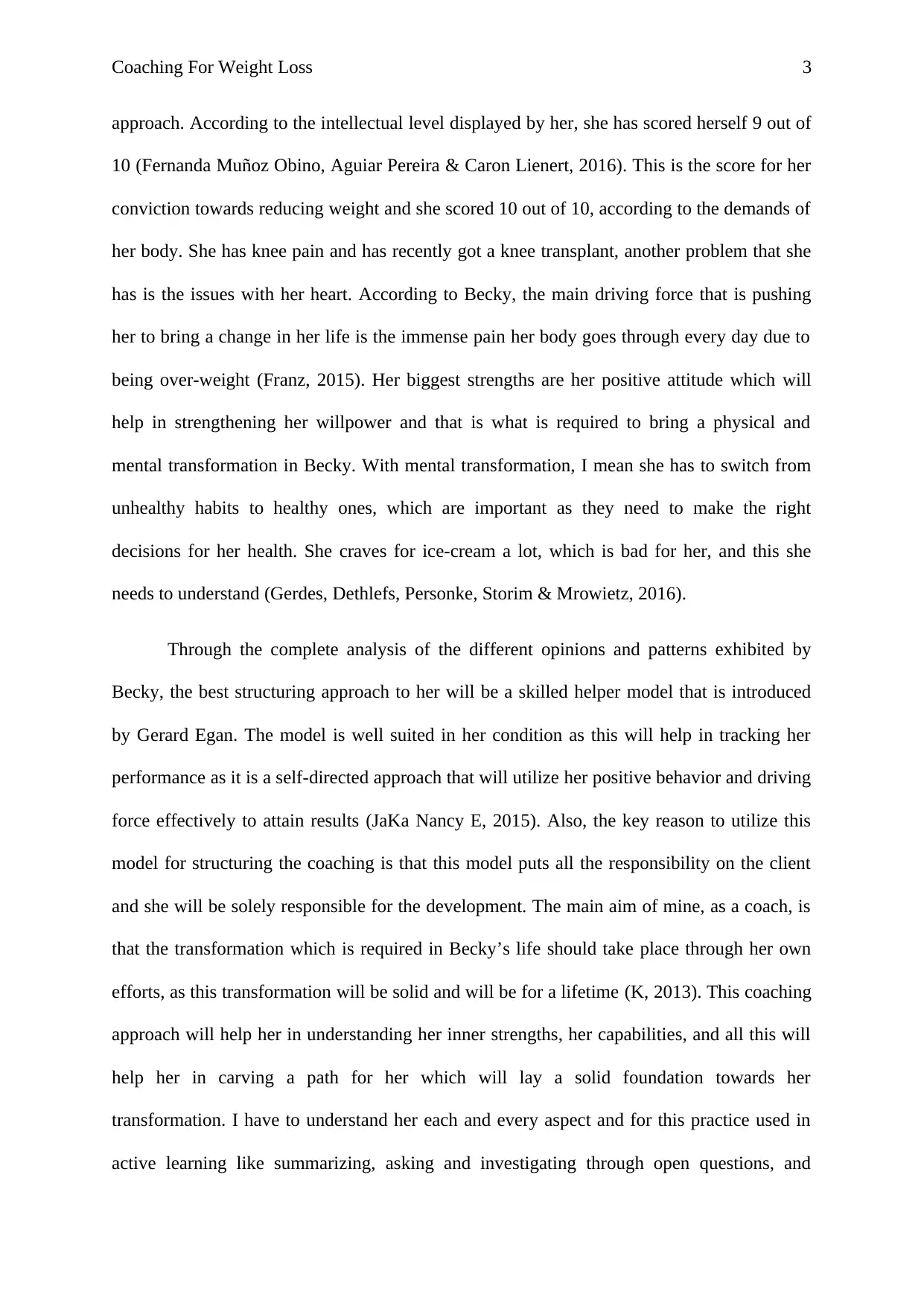
Coaching For Weight Loss 3
approach. According to the intellectual level displayed by her, she has scored herself 9 out of
10 (Fernanda Muñoz Obino, Aguiar Pereira & Caron Lienert, 2016). This is the score for her
conviction towards reducing weight and she scored 10 out of 10, according to the demands of
her body. She has knee pain and has recently got a knee transplant, another problem that she
has is the issues with her heart. According to Becky, the main driving force that is pushing
her to bring a change in her life is the immense pain her body goes through every day due to
being over-weight (Franz, 2015). Her biggest strengths are her positive attitude which will
help in strengthening her willpower and that is what is required to bring a physical and
mental transformation in Becky. With mental transformation, I mean she has to switch from
unhealthy habits to healthy ones, which are important as they need to make the right
decisions for her health. She craves for ice-cream a lot, which is bad for her, and this she
needs to understand (Gerdes, Dethlefs, Personke, Storim & Mrowietz, 2016).
Through the complete analysis of the different opinions and patterns exhibited by
Becky, the best structuring approach to her will be a skilled helper model that is introduced
by Gerard Egan. The model is well suited in her condition as this will help in tracking her
performance as it is a self-directed approach that will utilize her positive behavior and driving
force effectively to attain results (JaKa Nancy E, 2015). Also, the key reason to utilize this
model for structuring the coaching is that this model puts all the responsibility on the client
and she will be solely responsible for the development. The main aim of mine, as a coach, is
that the transformation which is required in Becky’s life should take place through her own
efforts, as this transformation will be solid and will be for a lifetime (K, 2013). This coaching
approach will help her in understanding her inner strengths, her capabilities, and all this will
help her in carving a path for her which will lay a solid foundation towards her
transformation. I have to understand her each and every aspect and for this practice used in
active learning like summarizing, asking and investigating through open questions, and
approach. According to the intellectual level displayed by her, she has scored herself 9 out of
10 (Fernanda Muñoz Obino, Aguiar Pereira & Caron Lienert, 2016). This is the score for her
conviction towards reducing weight and she scored 10 out of 10, according to the demands of
her body. She has knee pain and has recently got a knee transplant, another problem that she
has is the issues with her heart. According to Becky, the main driving force that is pushing
her to bring a change in her life is the immense pain her body goes through every day due to
being over-weight (Franz, 2015). Her biggest strengths are her positive attitude which will
help in strengthening her willpower and that is what is required to bring a physical and
mental transformation in Becky. With mental transformation, I mean she has to switch from
unhealthy habits to healthy ones, which are important as they need to make the right
decisions for her health. She craves for ice-cream a lot, which is bad for her, and this she
needs to understand (Gerdes, Dethlefs, Personke, Storim & Mrowietz, 2016).
Through the complete analysis of the different opinions and patterns exhibited by
Becky, the best structuring approach to her will be a skilled helper model that is introduced
by Gerard Egan. The model is well suited in her condition as this will help in tracking her
performance as it is a self-directed approach that will utilize her positive behavior and driving
force effectively to attain results (JaKa Nancy E, 2015). Also, the key reason to utilize this
model for structuring the coaching is that this model puts all the responsibility on the client
and she will be solely responsible for the development. The main aim of mine, as a coach, is
that the transformation which is required in Becky’s life should take place through her own
efforts, as this transformation will be solid and will be for a lifetime (K, 2013). This coaching
approach will help her in understanding her inner strengths, her capabilities, and all this will
help her in carving a path for her which will lay a solid foundation towards her
transformation. I have to understand her each and every aspect and for this practice used in
active learning like summarizing, asking and investigating through open questions, and
Paraphrase This Document
Need a fresh take? Get an instant paraphrase of this document with our AI Paraphraser
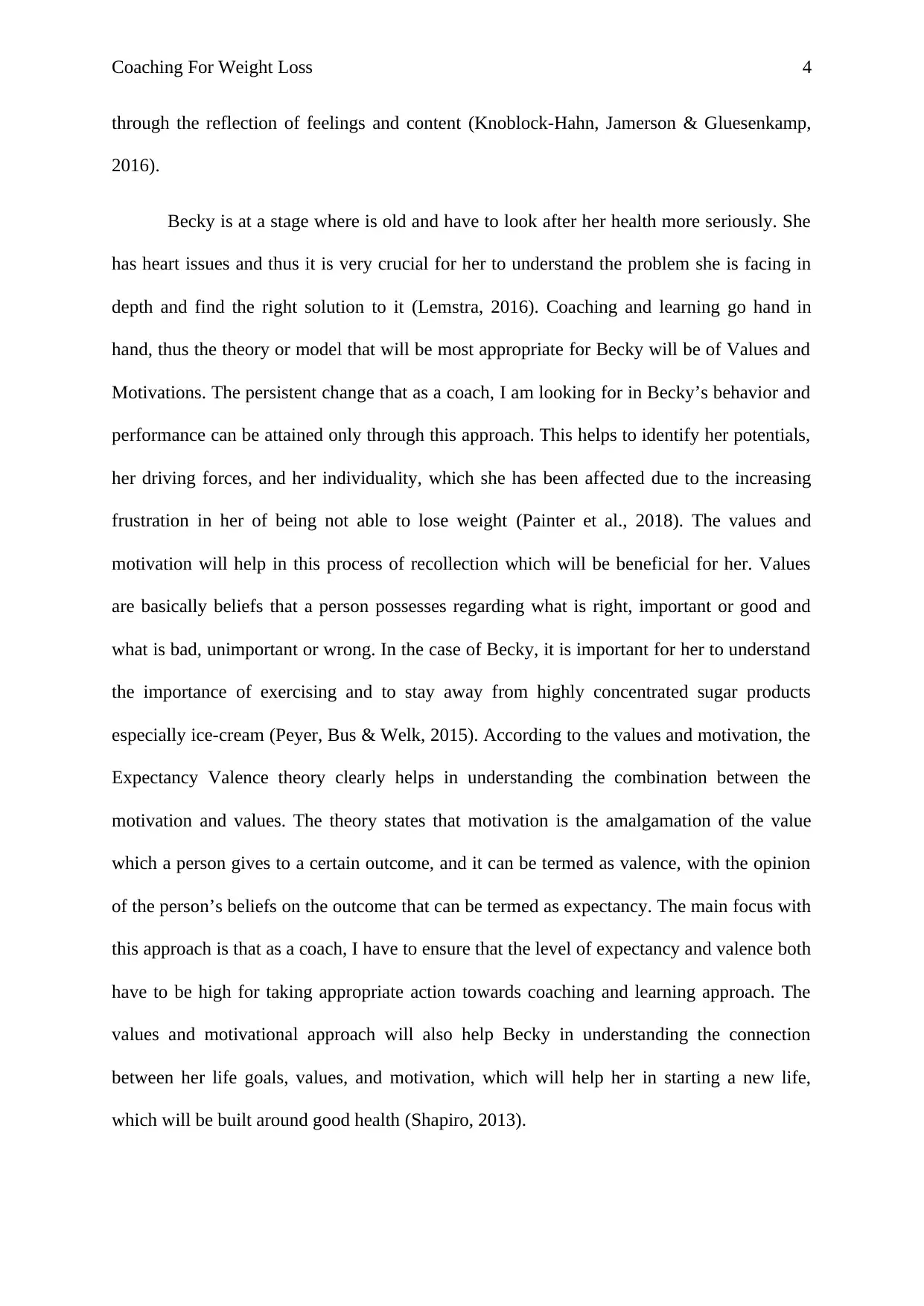
Coaching For Weight Loss 4
through the reflection of feelings and content (Knoblock-Hahn, Jamerson & Gluesenkamp,
2016).
Becky is at a stage where is old and have to look after her health more seriously. She
has heart issues and thus it is very crucial for her to understand the problem she is facing in
depth and find the right solution to it (Lemstra, 2016). Coaching and learning go hand in
hand, thus the theory or model that will be most appropriate for Becky will be of Values and
Motivations. The persistent change that as a coach, I am looking for in Becky’s behavior and
performance can be attained only through this approach. This helps to identify her potentials,
her driving forces, and her individuality, which she has been affected due to the increasing
frustration in her of being not able to lose weight (Painter et al., 2018). The values and
motivation will help in this process of recollection which will be beneficial for her. Values
are basically beliefs that a person possesses regarding what is right, important or good and
what is bad, unimportant or wrong. In the case of Becky, it is important for her to understand
the importance of exercising and to stay away from highly concentrated sugar products
especially ice-cream (Peyer, Bus & Welk, 2015). According to the values and motivation, the
Expectancy Valence theory clearly helps in understanding the combination between the
motivation and values. The theory states that motivation is the amalgamation of the value
which a person gives to a certain outcome, and it can be termed as valence, with the opinion
of the person’s beliefs on the outcome that can be termed as expectancy. The main focus with
this approach is that as a coach, I have to ensure that the level of expectancy and valence both
have to be high for taking appropriate action towards coaching and learning approach. The
values and motivational approach will also help Becky in understanding the connection
between her life goals, values, and motivation, which will help her in starting a new life,
which will be built around good health (Shapiro, 2013).
through the reflection of feelings and content (Knoblock-Hahn, Jamerson & Gluesenkamp,
2016).
Becky is at a stage where is old and have to look after her health more seriously. She
has heart issues and thus it is very crucial for her to understand the problem she is facing in
depth and find the right solution to it (Lemstra, 2016). Coaching and learning go hand in
hand, thus the theory or model that will be most appropriate for Becky will be of Values and
Motivations. The persistent change that as a coach, I am looking for in Becky’s behavior and
performance can be attained only through this approach. This helps to identify her potentials,
her driving forces, and her individuality, which she has been affected due to the increasing
frustration in her of being not able to lose weight (Painter et al., 2018). The values and
motivation will help in this process of recollection which will be beneficial for her. Values
are basically beliefs that a person possesses regarding what is right, important or good and
what is bad, unimportant or wrong. In the case of Becky, it is important for her to understand
the importance of exercising and to stay away from highly concentrated sugar products
especially ice-cream (Peyer, Bus & Welk, 2015). According to the values and motivation, the
Expectancy Valence theory clearly helps in understanding the combination between the
motivation and values. The theory states that motivation is the amalgamation of the value
which a person gives to a certain outcome, and it can be termed as valence, with the opinion
of the person’s beliefs on the outcome that can be termed as expectancy. The main focus with
this approach is that as a coach, I have to ensure that the level of expectancy and valence both
have to be high for taking appropriate action towards coaching and learning approach. The
values and motivational approach will also help Becky in understanding the connection
between her life goals, values, and motivation, which will help her in starting a new life,
which will be built around good health (Shapiro, 2013).
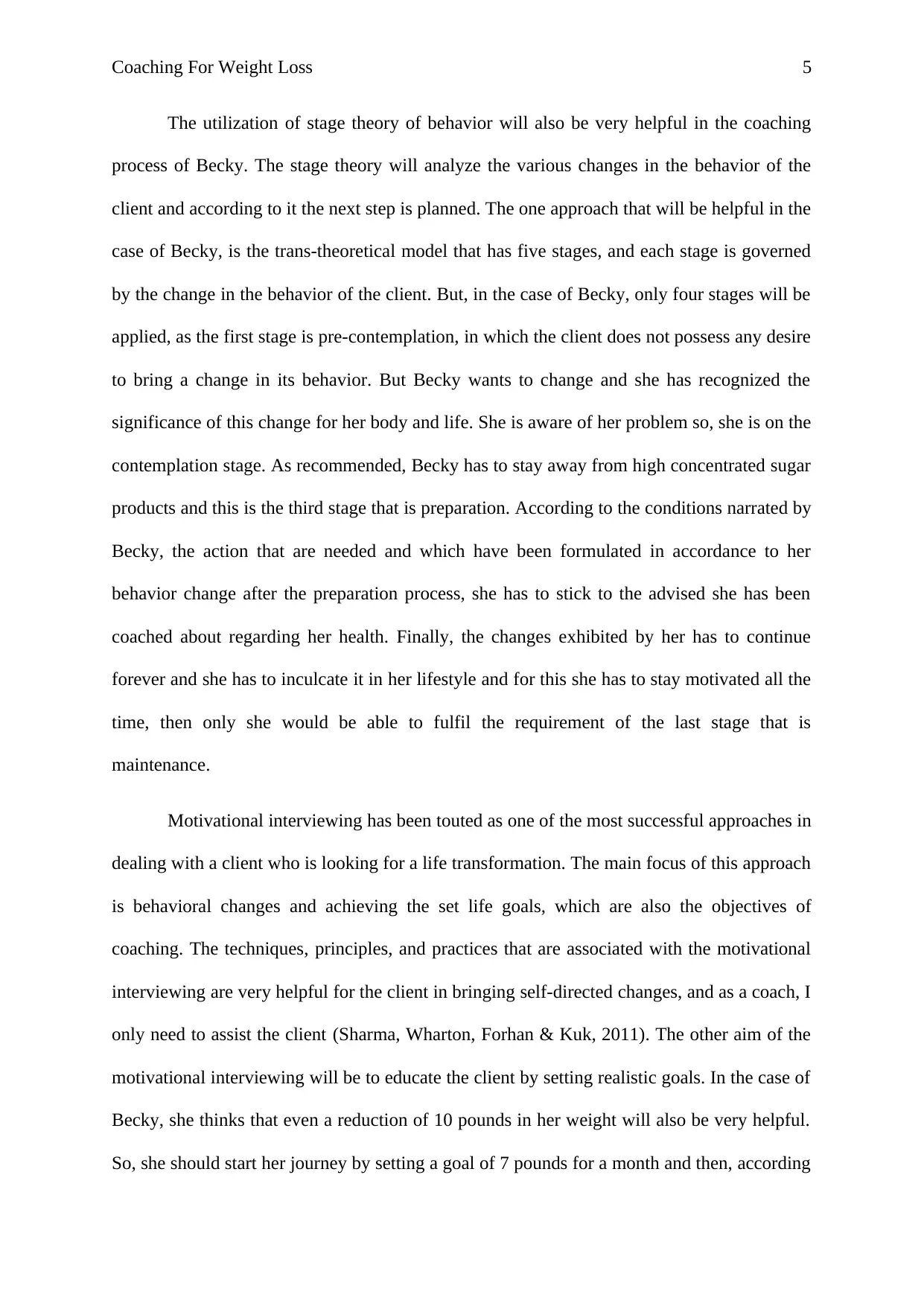
Coaching For Weight Loss 5
The utilization of stage theory of behavior will also be very helpful in the coaching
process of Becky. The stage theory will analyze the various changes in the behavior of the
client and according to it the next step is planned. The one approach that will be helpful in the
case of Becky, is the trans-theoretical model that has five stages, and each stage is governed
by the change in the behavior of the client. But, in the case of Becky, only four stages will be
applied, as the first stage is pre-contemplation, in which the client does not possess any desire
to bring a change in its behavior. But Becky wants to change and she has recognized the
significance of this change for her body and life. She is aware of her problem so, she is on the
contemplation stage. As recommended, Becky has to stay away from high concentrated sugar
products and this is the third stage that is preparation. According to the conditions narrated by
Becky, the action that are needed and which have been formulated in accordance to her
behavior change after the preparation process, she has to stick to the advised she has been
coached about regarding her health. Finally, the changes exhibited by her has to continue
forever and she has to inculcate it in her lifestyle and for this she has to stay motivated all the
time, then only she would be able to fulfil the requirement of the last stage that is
maintenance.
Motivational interviewing has been touted as one of the most successful approaches in
dealing with a client who is looking for a life transformation. The main focus of this approach
is behavioral changes and achieving the set life goals, which are also the objectives of
coaching. The techniques, principles, and practices that are associated with the motivational
interviewing are very helpful for the client in bringing self-directed changes, and as a coach, I
only need to assist the client (Sharma, Wharton, Forhan & Kuk, 2011). The other aim of the
motivational interviewing will be to educate the client by setting realistic goals. In the case of
Becky, she thinks that even a reduction of 10 pounds in her weight will also be very helpful.
So, she should start her journey by setting a goal of 7 pounds for a month and then, according
The utilization of stage theory of behavior will also be very helpful in the coaching
process of Becky. The stage theory will analyze the various changes in the behavior of the
client and according to it the next step is planned. The one approach that will be helpful in the
case of Becky, is the trans-theoretical model that has five stages, and each stage is governed
by the change in the behavior of the client. But, in the case of Becky, only four stages will be
applied, as the first stage is pre-contemplation, in which the client does not possess any desire
to bring a change in its behavior. But Becky wants to change and she has recognized the
significance of this change for her body and life. She is aware of her problem so, she is on the
contemplation stage. As recommended, Becky has to stay away from high concentrated sugar
products and this is the third stage that is preparation. According to the conditions narrated by
Becky, the action that are needed and which have been formulated in accordance to her
behavior change after the preparation process, she has to stick to the advised she has been
coached about regarding her health. Finally, the changes exhibited by her has to continue
forever and she has to inculcate it in her lifestyle and for this she has to stay motivated all the
time, then only she would be able to fulfil the requirement of the last stage that is
maintenance.
Motivational interviewing has been touted as one of the most successful approaches in
dealing with a client who is looking for a life transformation. The main focus of this approach
is behavioral changes and achieving the set life goals, which are also the objectives of
coaching. The techniques, principles, and practices that are associated with the motivational
interviewing are very helpful for the client in bringing self-directed changes, and as a coach, I
only need to assist the client (Sharma, Wharton, Forhan & Kuk, 2011). The other aim of the
motivational interviewing will be to educate the client by setting realistic goals. In the case of
Becky, she thinks that even a reduction of 10 pounds in her weight will also be very helpful.
So, she should start her journey by setting a goal of 7 pounds for a month and then, according
⊘ This is a preview!⊘
Do you want full access?
Subscribe today to unlock all pages.

Trusted by 1+ million students worldwide
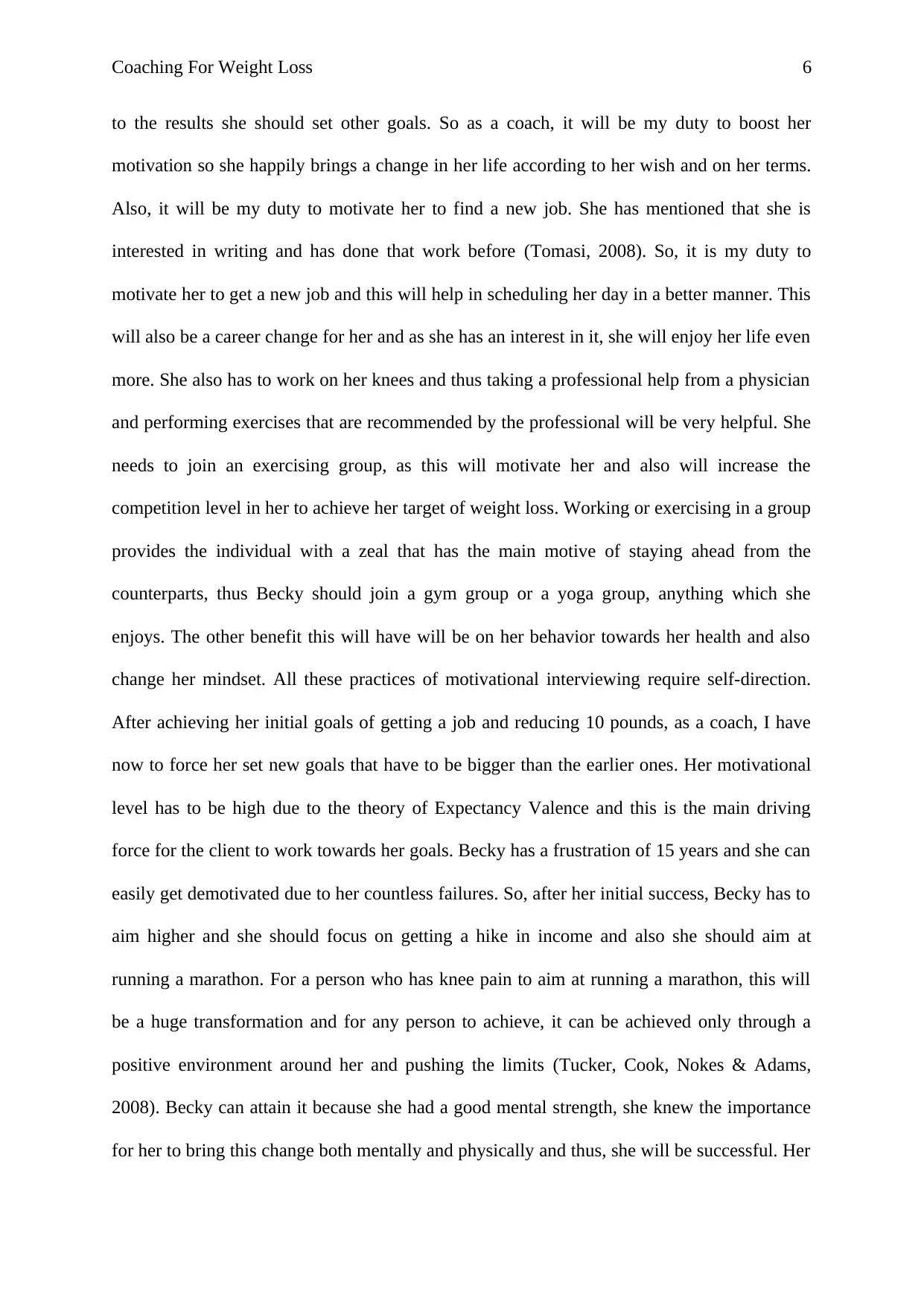
Coaching For Weight Loss 6
to the results she should set other goals. So as a coach, it will be my duty to boost her
motivation so she happily brings a change in her life according to her wish and on her terms.
Also, it will be my duty to motivate her to find a new job. She has mentioned that she is
interested in writing and has done that work before (Tomasi, 2008). So, it is my duty to
motivate her to get a new job and this will help in scheduling her day in a better manner. This
will also be a career change for her and as she has an interest in it, she will enjoy her life even
more. She also has to work on her knees and thus taking a professional help from a physician
and performing exercises that are recommended by the professional will be very helpful. She
needs to join an exercising group, as this will motivate her and also will increase the
competition level in her to achieve her target of weight loss. Working or exercising in a group
provides the individual with a zeal that has the main motive of staying ahead from the
counterparts, thus Becky should join a gym group or a yoga group, anything which she
enjoys. The other benefit this will have will be on her behavior towards her health and also
change her mindset. All these practices of motivational interviewing require self-direction.
After achieving her initial goals of getting a job and reducing 10 pounds, as a coach, I have
now to force her set new goals that have to be bigger than the earlier ones. Her motivational
level has to be high due to the theory of Expectancy Valence and this is the main driving
force for the client to work towards her goals. Becky has a frustration of 15 years and she can
easily get demotivated due to her countless failures. So, after her initial success, Becky has to
aim higher and she should focus on getting a hike in income and also she should aim at
running a marathon. For a person who has knee pain to aim at running a marathon, this will
be a huge transformation and for any person to achieve, it can be achieved only through a
positive environment around her and pushing the limits (Tucker, Cook, Nokes & Adams,
2008). Becky can attain it because she had a good mental strength, she knew the importance
for her to bring this change both mentally and physically and thus, she will be successful. Her
to the results she should set other goals. So as a coach, it will be my duty to boost her
motivation so she happily brings a change in her life according to her wish and on her terms.
Also, it will be my duty to motivate her to find a new job. She has mentioned that she is
interested in writing and has done that work before (Tomasi, 2008). So, it is my duty to
motivate her to get a new job and this will help in scheduling her day in a better manner. This
will also be a career change for her and as she has an interest in it, she will enjoy her life even
more. She also has to work on her knees and thus taking a professional help from a physician
and performing exercises that are recommended by the professional will be very helpful. She
needs to join an exercising group, as this will motivate her and also will increase the
competition level in her to achieve her target of weight loss. Working or exercising in a group
provides the individual with a zeal that has the main motive of staying ahead from the
counterparts, thus Becky should join a gym group or a yoga group, anything which she
enjoys. The other benefit this will have will be on her behavior towards her health and also
change her mindset. All these practices of motivational interviewing require self-direction.
After achieving her initial goals of getting a job and reducing 10 pounds, as a coach, I have
now to force her set new goals that have to be bigger than the earlier ones. Her motivational
level has to be high due to the theory of Expectancy Valence and this is the main driving
force for the client to work towards her goals. Becky has a frustration of 15 years and she can
easily get demotivated due to her countless failures. So, after her initial success, Becky has to
aim higher and she should focus on getting a hike in income and also she should aim at
running a marathon. For a person who has knee pain to aim at running a marathon, this will
be a huge transformation and for any person to achieve, it can be achieved only through a
positive environment around her and pushing the limits (Tucker, Cook, Nokes & Adams,
2008). Becky can attain it because she had a good mental strength, she knew the importance
for her to bring this change both mentally and physically and thus, she will be successful. Her
Paraphrase This Document
Need a fresh take? Get an instant paraphrase of this document with our AI Paraphraser
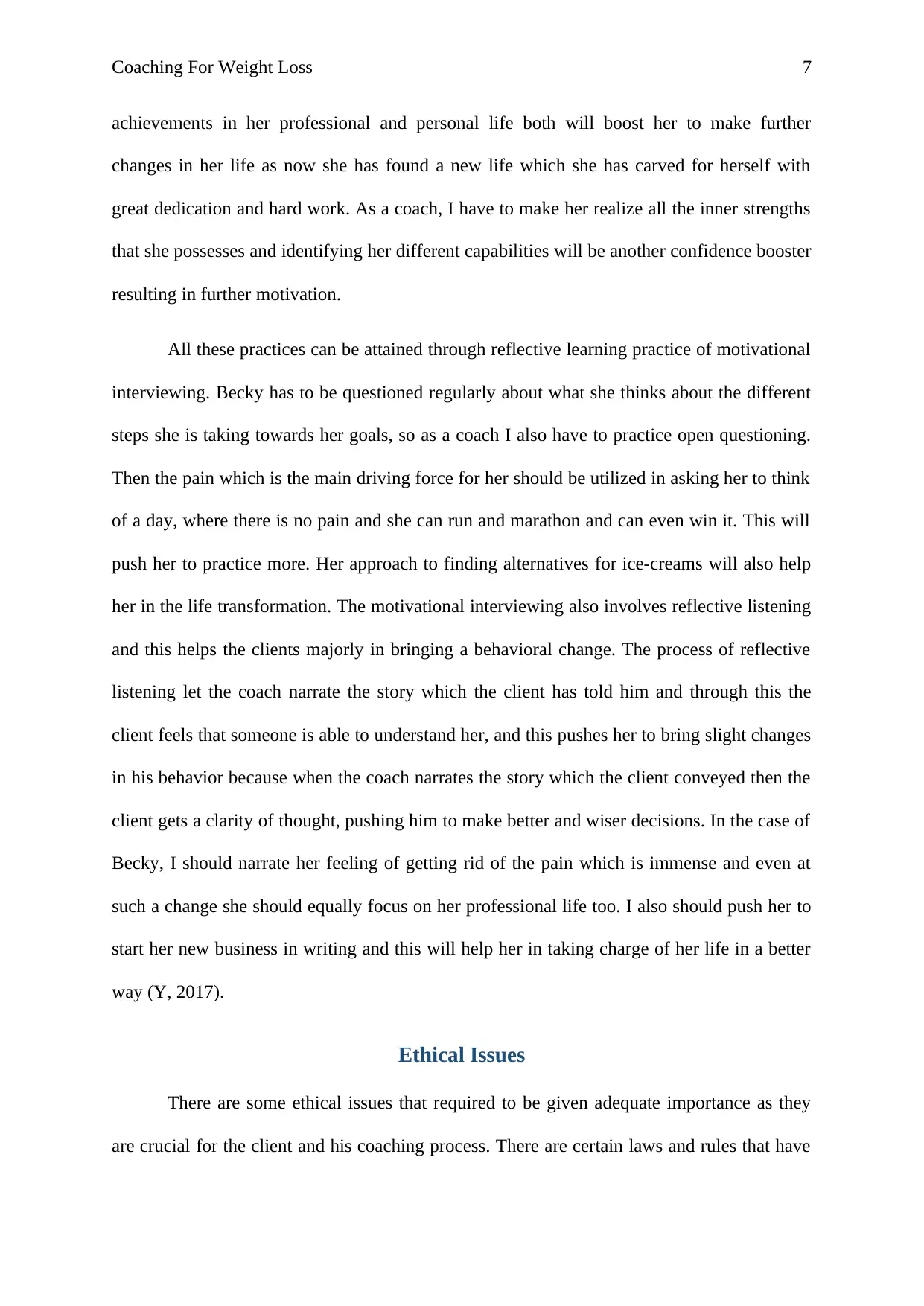
Coaching For Weight Loss 7
achievements in her professional and personal life both will boost her to make further
changes in her life as now she has found a new life which she has carved for herself with
great dedication and hard work. As a coach, I have to make her realize all the inner strengths
that she possesses and identifying her different capabilities will be another confidence booster
resulting in further motivation.
All these practices can be attained through reflective learning practice of motivational
interviewing. Becky has to be questioned regularly about what she thinks about the different
steps she is taking towards her goals, so as a coach I also have to practice open questioning.
Then the pain which is the main driving force for her should be utilized in asking her to think
of a day, where there is no pain and she can run and marathon and can even win it. This will
push her to practice more. Her approach to finding alternatives for ice-creams will also help
her in the life transformation. The motivational interviewing also involves reflective listening
and this helps the clients majorly in bringing a behavioral change. The process of reflective
listening let the coach narrate the story which the client has told him and through this the
client feels that someone is able to understand her, and this pushes her to bring slight changes
in his behavior because when the coach narrates the story which the client conveyed then the
client gets a clarity of thought, pushing him to make better and wiser decisions. In the case of
Becky, I should narrate her feeling of getting rid of the pain which is immense and even at
such a change she should equally focus on her professional life too. I also should push her to
start her new business in writing and this will help her in taking charge of her life in a better
way (Y, 2017).
Ethical Issues
There are some ethical issues that required to be given adequate importance as they
are crucial for the client and his coaching process. There are certain laws and rules that have
achievements in her professional and personal life both will boost her to make further
changes in her life as now she has found a new life which she has carved for herself with
great dedication and hard work. As a coach, I have to make her realize all the inner strengths
that she possesses and identifying her different capabilities will be another confidence booster
resulting in further motivation.
All these practices can be attained through reflective learning practice of motivational
interviewing. Becky has to be questioned regularly about what she thinks about the different
steps she is taking towards her goals, so as a coach I also have to practice open questioning.
Then the pain which is the main driving force for her should be utilized in asking her to think
of a day, where there is no pain and she can run and marathon and can even win it. This will
push her to practice more. Her approach to finding alternatives for ice-creams will also help
her in the life transformation. The motivational interviewing also involves reflective listening
and this helps the clients majorly in bringing a behavioral change. The process of reflective
listening let the coach narrate the story which the client has told him and through this the
client feels that someone is able to understand her, and this pushes her to bring slight changes
in his behavior because when the coach narrates the story which the client conveyed then the
client gets a clarity of thought, pushing him to make better and wiser decisions. In the case of
Becky, I should narrate her feeling of getting rid of the pain which is immense and even at
such a change she should equally focus on her professional life too. I also should push her to
start her new business in writing and this will help her in taking charge of her life in a better
way (Y, 2017).
Ethical Issues
There are some ethical issues that required to be given adequate importance as they
are crucial for the client and his coaching process. There are certain laws and rules that have
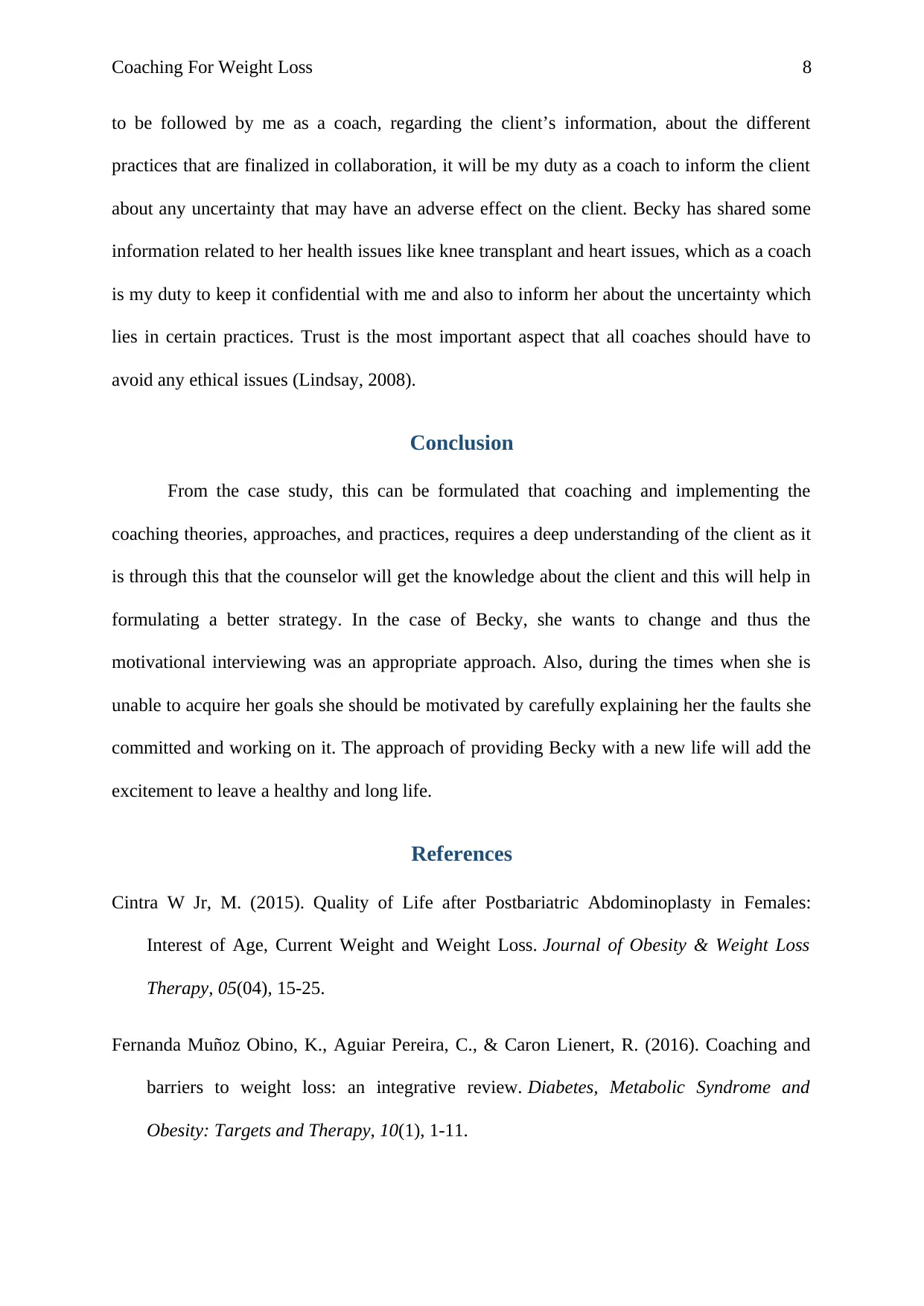
Coaching For Weight Loss 8
to be followed by me as a coach, regarding the client’s information, about the different
practices that are finalized in collaboration, it will be my duty as a coach to inform the client
about any uncertainty that may have an adverse effect on the client. Becky has shared some
information related to her health issues like knee transplant and heart issues, which as a coach
is my duty to keep it confidential with me and also to inform her about the uncertainty which
lies in certain practices. Trust is the most important aspect that all coaches should have to
avoid any ethical issues (Lindsay, 2008).
Conclusion
From the case study, this can be formulated that coaching and implementing the
coaching theories, approaches, and practices, requires a deep understanding of the client as it
is through this that the counselor will get the knowledge about the client and this will help in
formulating a better strategy. In the case of Becky, she wants to change and thus the
motivational interviewing was an appropriate approach. Also, during the times when she is
unable to acquire her goals she should be motivated by carefully explaining her the faults she
committed and working on it. The approach of providing Becky with a new life will add the
excitement to leave a healthy and long life.
References
Cintra W Jr, M. (2015). Quality of Life after Postbariatric Abdominoplasty in Females:
Interest of Age, Current Weight and Weight Loss. Journal of Obesity & Weight Loss
Therapy, 05(04), 15-25.
Fernanda Muñoz Obino, K., Aguiar Pereira, C., & Caron Lienert, R. (2016). Coaching and
barriers to weight loss: an integrative review. Diabetes, Metabolic Syndrome and
Obesity: Targets and Therapy, 10(1), 1-11.
to be followed by me as a coach, regarding the client’s information, about the different
practices that are finalized in collaboration, it will be my duty as a coach to inform the client
about any uncertainty that may have an adverse effect on the client. Becky has shared some
information related to her health issues like knee transplant and heart issues, which as a coach
is my duty to keep it confidential with me and also to inform her about the uncertainty which
lies in certain practices. Trust is the most important aspect that all coaches should have to
avoid any ethical issues (Lindsay, 2008).
Conclusion
From the case study, this can be formulated that coaching and implementing the
coaching theories, approaches, and practices, requires a deep understanding of the client as it
is through this that the counselor will get the knowledge about the client and this will help in
formulating a better strategy. In the case of Becky, she wants to change and thus the
motivational interviewing was an appropriate approach. Also, during the times when she is
unable to acquire her goals she should be motivated by carefully explaining her the faults she
committed and working on it. The approach of providing Becky with a new life will add the
excitement to leave a healthy and long life.
References
Cintra W Jr, M. (2015). Quality of Life after Postbariatric Abdominoplasty in Females:
Interest of Age, Current Weight and Weight Loss. Journal of Obesity & Weight Loss
Therapy, 05(04), 15-25.
Fernanda Muñoz Obino, K., Aguiar Pereira, C., & Caron Lienert, R. (2016). Coaching and
barriers to weight loss: an integrative review. Diabetes, Metabolic Syndrome and
Obesity: Targets and Therapy, 10(1), 1-11.
⊘ This is a preview!⊘
Do you want full access?
Subscribe today to unlock all pages.

Trusted by 1+ million students worldwide
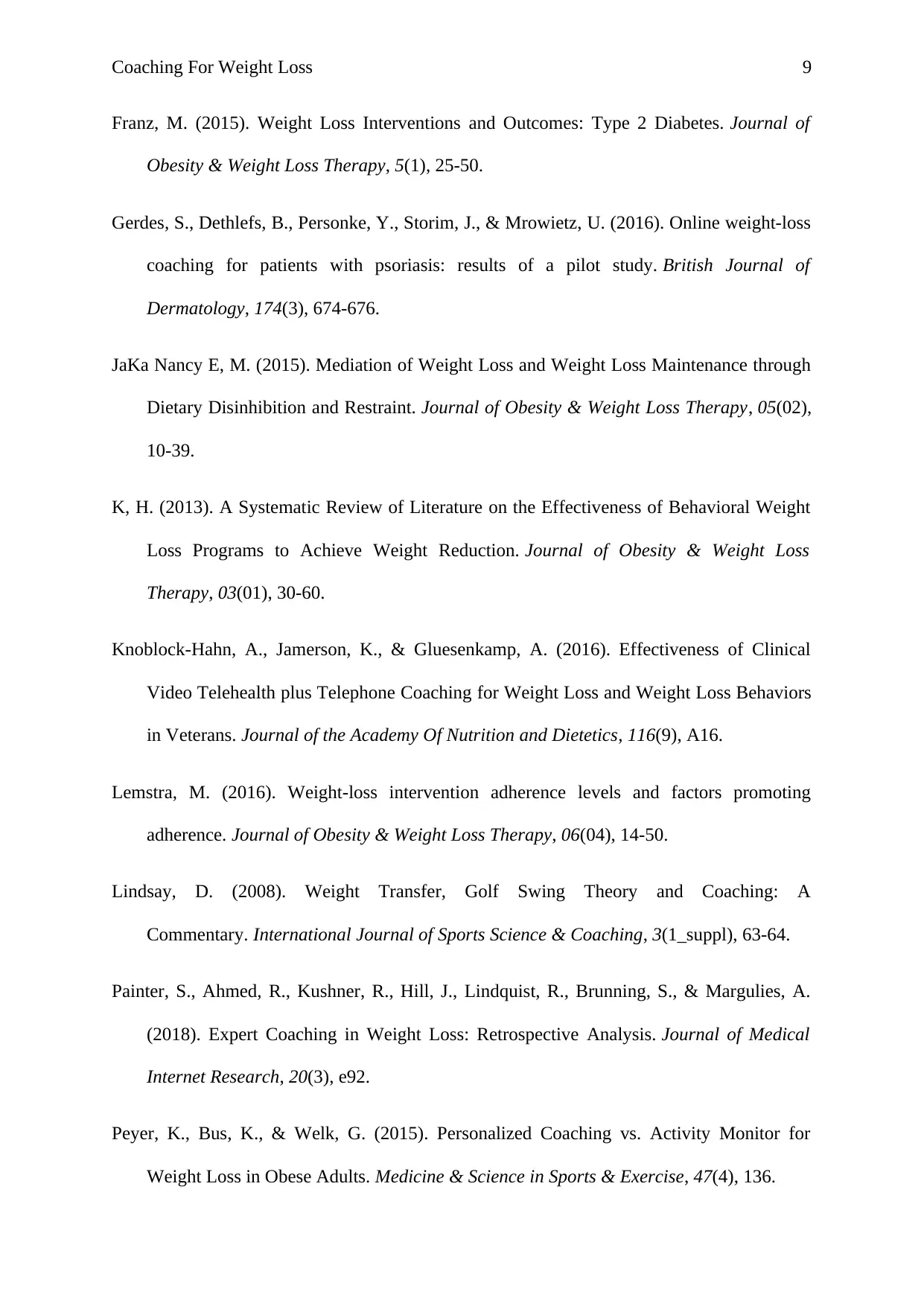
Coaching For Weight Loss 9
Franz, M. (2015). Weight Loss Interventions and Outcomes: Type 2 Diabetes. Journal of
Obesity & Weight Loss Therapy, 5(1), 25-50.
Gerdes, S., Dethlefs, B., Personke, Y., Storim, J., & Mrowietz, U. (2016). Online weight-loss
coaching for patients with psoriasis: results of a pilot study. British Journal of
Dermatology, 174(3), 674-676.
JaKa Nancy E, M. (2015). Mediation of Weight Loss and Weight Loss Maintenance through
Dietary Disinhibition and Restraint. Journal of Obesity & Weight Loss Therapy, 05(02),
10-39.
K, H. (2013). A Systematic Review of Literature on the Effectiveness of Behavioral Weight
Loss Programs to Achieve Weight Reduction. Journal of Obesity & Weight Loss
Therapy, 03(01), 30-60.
Knoblock-Hahn, A., Jamerson, K., & Gluesenkamp, A. (2016). Effectiveness of Clinical
Video Telehealth plus Telephone Coaching for Weight Loss and Weight Loss Behaviors
in Veterans. Journal of the Academy Of Nutrition and Dietetics, 116(9), A16.
Lemstra, M. (2016). Weight-loss intervention adherence levels and factors promoting
adherence. Journal of Obesity & Weight Loss Therapy, 06(04), 14-50.
Lindsay, D. (2008). Weight Transfer, Golf Swing Theory and Coaching: A
Commentary. International Journal of Sports Science & Coaching, 3(1_suppl), 63-64.
Painter, S., Ahmed, R., Kushner, R., Hill, J., Lindquist, R., Brunning, S., & Margulies, A.
(2018). Expert Coaching in Weight Loss: Retrospective Analysis. Journal of Medical
Internet Research, 20(3), e92.
Peyer, K., Bus, K., & Welk, G. (2015). Personalized Coaching vs. Activity Monitor for
Weight Loss in Obese Adults. Medicine & Science in Sports & Exercise, 47(4), 136.
Franz, M. (2015). Weight Loss Interventions and Outcomes: Type 2 Diabetes. Journal of
Obesity & Weight Loss Therapy, 5(1), 25-50.
Gerdes, S., Dethlefs, B., Personke, Y., Storim, J., & Mrowietz, U. (2016). Online weight-loss
coaching for patients with psoriasis: results of a pilot study. British Journal of
Dermatology, 174(3), 674-676.
JaKa Nancy E, M. (2015). Mediation of Weight Loss and Weight Loss Maintenance through
Dietary Disinhibition and Restraint. Journal of Obesity & Weight Loss Therapy, 05(02),
10-39.
K, H. (2013). A Systematic Review of Literature on the Effectiveness of Behavioral Weight
Loss Programs to Achieve Weight Reduction. Journal of Obesity & Weight Loss
Therapy, 03(01), 30-60.
Knoblock-Hahn, A., Jamerson, K., & Gluesenkamp, A. (2016). Effectiveness of Clinical
Video Telehealth plus Telephone Coaching for Weight Loss and Weight Loss Behaviors
in Veterans. Journal of the Academy Of Nutrition and Dietetics, 116(9), A16.
Lemstra, M. (2016). Weight-loss intervention adherence levels and factors promoting
adherence. Journal of Obesity & Weight Loss Therapy, 06(04), 14-50.
Lindsay, D. (2008). Weight Transfer, Golf Swing Theory and Coaching: A
Commentary. International Journal of Sports Science & Coaching, 3(1_suppl), 63-64.
Painter, S., Ahmed, R., Kushner, R., Hill, J., Lindquist, R., Brunning, S., & Margulies, A.
(2018). Expert Coaching in Weight Loss: Retrospective Analysis. Journal of Medical
Internet Research, 20(3), e92.
Peyer, K., Bus, K., & Welk, G. (2015). Personalized Coaching vs. Activity Monitor for
Weight Loss in Obese Adults. Medicine & Science in Sports & Exercise, 47(4), 136.
Paraphrase This Document
Need a fresh take? Get an instant paraphrase of this document with our AI Paraphraser
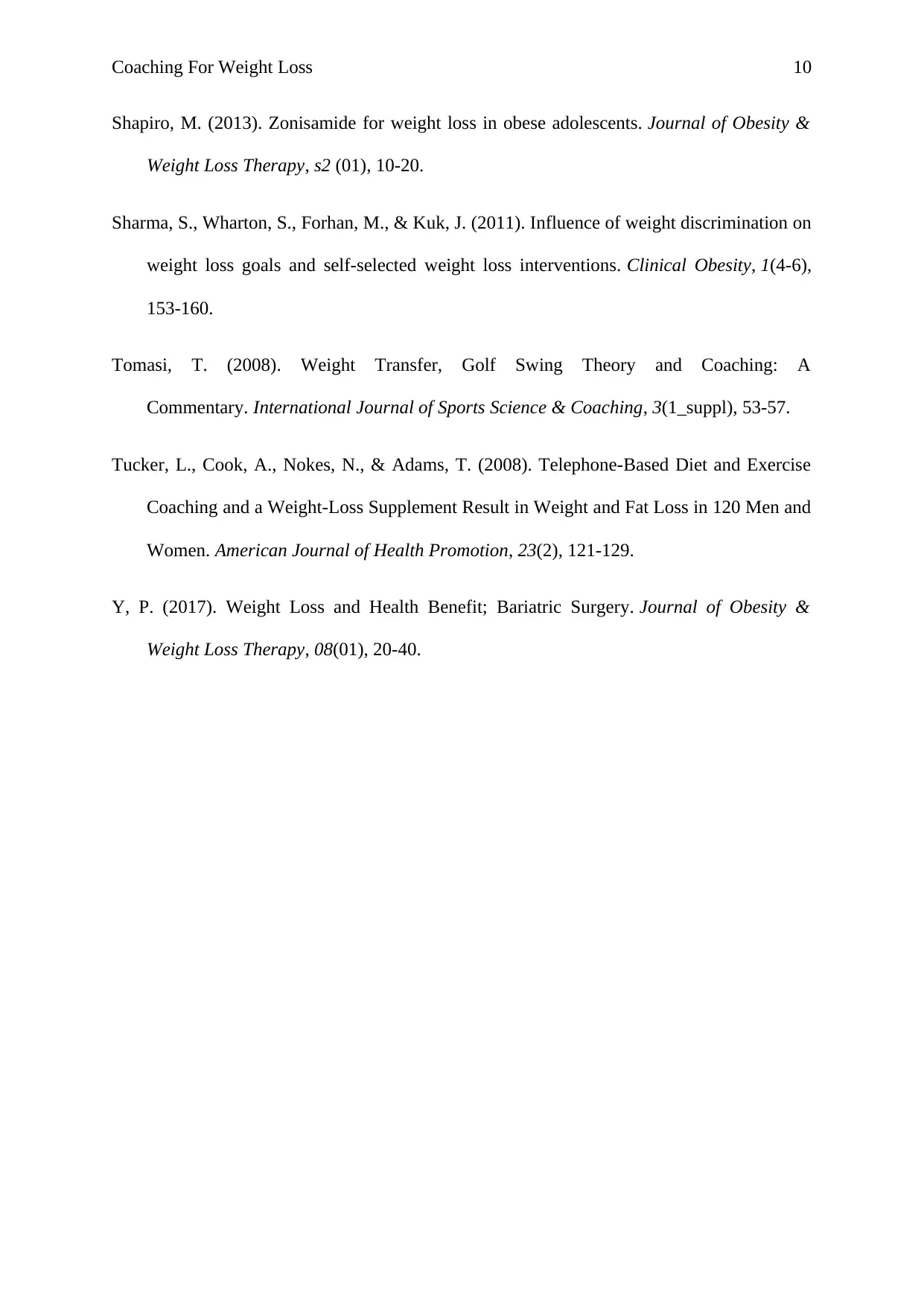
Coaching For Weight Loss 10
Shapiro, M. (2013). Zonisamide for weight loss in obese adolescents. Journal of Obesity &
Weight Loss Therapy, s2 (01), 10-20.
Sharma, S., Wharton, S., Forhan, M., & Kuk, J. (2011). Influence of weight discrimination on
weight loss goals and self-selected weight loss interventions. Clinical Obesity, 1(4-6),
153-160.
Tomasi, T. (2008). Weight Transfer, Golf Swing Theory and Coaching: A
Commentary. International Journal of Sports Science & Coaching, 3(1_suppl), 53-57.
Tucker, L., Cook, A., Nokes, N., & Adams, T. (2008). Telephone-Based Diet and Exercise
Coaching and a Weight-Loss Supplement Result in Weight and Fat Loss in 120 Men and
Women. American Journal of Health Promotion, 23(2), 121-129.
Y, P. (2017). Weight Loss and Health Benefit; Bariatric Surgery. Journal of Obesity &
Weight Loss Therapy, 08(01), 20-40.
Shapiro, M. (2013). Zonisamide for weight loss in obese adolescents. Journal of Obesity &
Weight Loss Therapy, s2 (01), 10-20.
Sharma, S., Wharton, S., Forhan, M., & Kuk, J. (2011). Influence of weight discrimination on
weight loss goals and self-selected weight loss interventions. Clinical Obesity, 1(4-6),
153-160.
Tomasi, T. (2008). Weight Transfer, Golf Swing Theory and Coaching: A
Commentary. International Journal of Sports Science & Coaching, 3(1_suppl), 53-57.
Tucker, L., Cook, A., Nokes, N., & Adams, T. (2008). Telephone-Based Diet and Exercise
Coaching and a Weight-Loss Supplement Result in Weight and Fat Loss in 120 Men and
Women. American Journal of Health Promotion, 23(2), 121-129.
Y, P. (2017). Weight Loss and Health Benefit; Bariatric Surgery. Journal of Obesity &
Weight Loss Therapy, 08(01), 20-40.

Coaching For Weight Loss 11
⊘ This is a preview!⊘
Do you want full access?
Subscribe today to unlock all pages.

Trusted by 1+ million students worldwide
1 out of 12
Your All-in-One AI-Powered Toolkit for Academic Success.
+13062052269
info@desklib.com
Available 24*7 on WhatsApp / Email
![[object Object]](/_next/static/media/star-bottom.7253800d.svg)
Unlock your academic potential
Copyright © 2020–2026 A2Z Services. All Rights Reserved. Developed and managed by ZUCOL.
